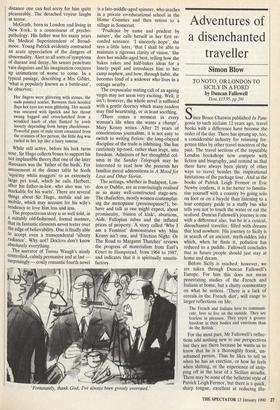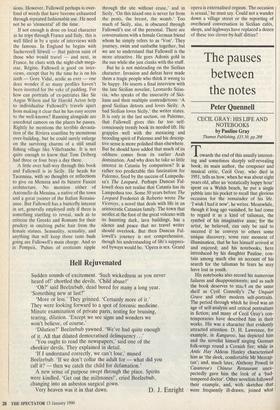Adventures of a disenchanted traveller
Simon Blow
TO NOTO, OR LONDON TO SICILY IN A FORD by Duncan Fallowell
Dent, £13.95, pp.291
Since Bruce Chatwin published In Pata- gonia to such acclaim 12 years ago, travel books with a difference have become the order of the day. There has sprung up, too, a considerable industry for reissuing for- gotten titles by other travel maestros of the past. The travel sections of the reputable London bookshops now compete with fiction and biography, and remind us that there have always been plenty of other ways to travel besides the inspirational limitations of the package tour. And as the books of Patrick Leigh Fermor or Eric Newby confirm, it is far better to familia- rise yourself with a country by going solo on foot or on a bicycle than listening to a tour company guide in a stuffy bus who tells you not to touch the water or eat the seafood. Duncan Fallowell's journey is one with a difference also, but he is a cynical, disenchanted traveller, filled with dreams that lead nowhere. His journey to Sicily is in search of an ancient, myth-ridden lake which, when he finds it, pollution has reduced to a puddle. Fallowell concludes that in future people should just stay at home and dream.
Before Sicily is reached, however, we are taken through Duncan Fallowell's Europe. For him this does not mean penetrating studies of the French and Italians at home, but a chatty commentary on what he notices. 'There is a lack of cereals in the French diet', will range to larger reflections on life:
The French and Italians love to communi- cate, love to live on the outside. They are fearless in pleasure. They enjoy a greater freedom in their bodies and emotions than do the British.
For the most part, Mr Fallowell's reflec- tions add nothing new to our perspectives but they are there because he wants us to know that he is a thoroughly frank, un- ashamed person. Thus he likes to tell us when he has an erection, or how he feels when shitting, or the experience of strip- ping off in the heat of a Sicilian arcadia. There may be none of the belletrist style of Patrick Leigh Fermor, but there is a quick, sharp tongue, excellent at reducing illu- sions. However, Fallowell perhaps is over- fond of words that have become exhausted through repeated fashionable use. He need not be so 'elemental' all the time.
If not enough is done on local character as he trips through France and Italy, this is well filled in by a spate of interviews with the famous. In England he begins with Sacheverell Sitwell —. that patron saint of those who would travel — and next, in France, he chats with the night-club mega- star, Regine. Fallowell is good on inter- views, except that by the time he is on his sixth — Gore Vidal, acidic as ever — one does wonder if so many profiles haven't been inserted for the sake of padding. For how can portraits of ex-patriates like Sir Angus Wilson and Sir Harold Acton help to individualise Fallowell's travels apart from making it clear that he has easy access to the well-known? Running alongside are anecdotal cameos on the places he passes. Rightly he mentions the terrible devasta- tion of the Riviera coastline by monstrous over-building, but he could surely enlarge on the surviving charms of a still small fishing village like Villefranche. It is not quite enough to know that Tom Driberg had three or four boys a day there.
A little over half-way through this book and Fallowell is in Sicily. He heads for Taormina, with no thoughts or reflections to give on Messina and its bizarre Fascist architecture. No mention either of Antonello da Messina, a native of the town and a great painter of the Italian Renaiss- ance. But Fallowell has a butterfly interest in art, generally employed only if there is something startling to reveal, such as to criticise the Greeks and Romans for their prudery in omitting pubic hair from the female statues. Sensuality, sexuality, and anything that will keep those taste buds going are Fallowell's main charge. And so in Pompeii, 'Pulses of eroticism ripple through the site without cease,' and in Sicily, 'On this island one is never far from the penis, the breast, the womb.' Too much of Sicily, alas, is obscured through Fallowell's use of the personal. There are conversations with a female German friend whom he simply refers to as 'Von'. They journey, swim and sunbathe together, but we are to understand that Fallowell is the more attractive. He goes Adonis gold in the sun while she just clanks with the stuff.
But he is not misleading on the Sicilian character. Invasion and defeat have made them a tragic people who think it wrong to be happy. He inserts a final interview with the late Sicilian novelist, Leonardo Scias- cia, who speaks of the insecurity of Sici- lians and their multiple contradictions: 'A good Sicilian detests and loves Sicily. A bad Sicilian loves Sicily,' the writer states. It is only in the last section, on Palermo, that Fallowell gives this far too self- consciously trendy book its needed lift. He grapples well with the menacing and brooding spirit of Palermo and his descrip- tive sense is more polished than elsewhere. But he should have added that much of its oddness comes from its earlier Arab domination. And why does he take so little interest in Catania by comparison? It is rather too predictable this fascination for Palermo, fired by the success of Lampedu- sa's The Leopard. Perhaps Duncan Fal- lowell does not realise that Catania has its Lampedusa too. Some 50 years before The Leopard Frederico di Roberto wrote The Viceroys, a novel that deals with life in an aristocratic Catanian family. The town that nestles at the foot of the great volcano with its haunting dark, lava buildings, has a silence and peace that no travel writer should overlook. But then Duncan Fal- lowell's journey is not comprehensive, though his understanding of life's suppres- sed byways would be. 'Opera is sex. Grand
opera is externalised orgasm. The occasion is sexual,' he must say. Could not a wander down a village street or the reporting of overheard conversation in Sicilian cafes, shops, and highways have replaced a dozen of these too clever-by-half ditties?











































 Previous page
Previous page